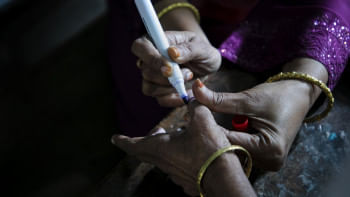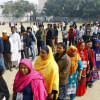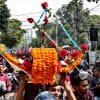An election more in form than in substance

In an election the outcome of which was known long before a single ballot was cast, it is difficult to say anything uplifting except perhaps to express our relief that it is finally over. The long known has eventuated without any surprise, and without much disturbance or violence, with Awami League set to get a fourth consecutive term in office. Normally, congratulations would be in order. If election consisted only of the act of voting, and the voting day, it was far from being the worst that could have happened. But such is the irony of our time that even a well-choreographed election cannot be held without some egregious incidents getting in the way.
For example, despite the election being basically between AL-nominated candidates and AL-enabled rivals—with the reins fully in the hands of the party—the voting process was not entirely free of disruptions or irregularities, with attempts of fraudulent voting reported in various areas. In Narsingdi, the son of the minister of industries was caught in casting fake votes. In Chattogram's Nasirabaad area, a journalist was beaten for taking pictures of vote rigging. There have been also reports of clashes in various areas, with a local Awami League leader in Munshiganj found dead with stab wounds earlier in the day. That being said, it must be acknowledged that over all, compared to the previous two elections held under the Awami League government in 2014 and 2018, this one was generally much more peaceful and nonviolent, and for that, the Election Commission and the security personnel on duty deserve credit.
But with the outcome of the election never in doubt, the ruling camp's focus was more on whether there would be enough voters to legitimise it, a plan that has suffered a setback, as many have anticipated. As per an early estimate by Chief Election Commissioner Kazi Habibul Awal, around 40 percent of votes were cast in the 12th parliamentary election. Even we if consider this to be an accurate representation of the reality, it is still far from the 50 percent turnout target that Awami League had reportedly set to make the election look "participatory" and acceptable to the international community. The 60 percent of voters who have stayed away are not absentees. They are the face of disenfranchisement in today's Bangladesh.
The truth is, it doesn't really matter how many voters ended up in the polling centres, willingly or under threat from ruling party men, when they were deprived of any real options to choose from. Whatever credibility their presence has lent to this far-from-ideal democratic exercise was severely affected by the absence of BNP and other opposition parties, who never really got a chance to play an effective part in it. This is, however, not to say that the opposition's role over the last few months leading to the election was always judicious or in the best interest of the nation. The resultant lack of hope or enthusiasm as witnessed among the voters or people in general is perhaps the biggest tragedy of this time. And it may cast a long shadow over our future.
As we now prepare for a life post-election, we can only hope that the protracted political tension will be resolved through peaceful means, and the national focus can once again shift to the more pertinent issues at hand, such as our economic crisis. Those who have been elected to parliament have a duty to the people, and regardless of the party they belong to or the electoral process they have emerged from, they will be held to their commitments and pledges in the coming days. For too long, this nation has been stuck in a state of limbo. We must find a way back to the path of unity and progress, both politically, socially and economically.


 For all latest news, follow The Daily Star's Google News channel.
For all latest news, follow The Daily Star's Google News channel. 











Comments